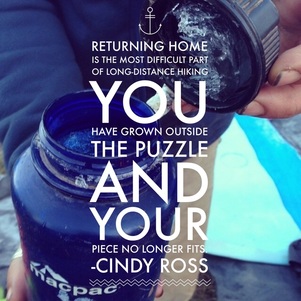 I was reading a bit this morning about the Hero’s Journey and comparing that literature to my approach with adolescents. In the bush, we have a large focus of what happens next and are always looking at how we can make sure the positive effects of our program transfer to life at home. I was speaking with a researcher in Sydney last week about this transfer and found his research to be so intriguing. Now we know that no matter what service we provide that the effects tend to diminish over time. This has been a real concern for out-of-home programs, like wilderness therapy, and why True North Expeditions puts such a large emphasis on follow-up support. But one thing we do not talk about much is how to make sure the positive effects of one-on-one counselling can endure. The researcher I spoke with said that of all the fields of education that airplane pilots have the best outcomes when it comes to transferring knowledge from practice to real life experience (as a nervous flyer I should hope so). But how does this fit into therapeutic work? Let’s use the example of drugs and alcohol. Many of the young people we see have struggled with drug abuse or addiction and benefit significantly from our 14-day program. Time away in a neutral environment provides them with ample time for reflection in one of the most supportive and nurturing setting. After becoming a successful team and feeling the benefits of being truly self-sufficient, our adolescents begin setting positive goals for themselves. They start to talk about life without the drugs and family conflicts. But they have not yet had the practice experience that leads to real world success. The struggle I can see is that many programs stop here. They provide a session or two of “relapse-prevention” work and send the client on their way. While brainstorming with my colleague about a research project we had in mind we continued to say that all of these interventions, adventure therapy included, provided fantastic opportunities for young people to start down the right path. I have always called it the “Therapy Booster Shot” but never the band-aid or quick fix. We have had the opportunity to live together building a strong relationship and setting achievable goals for success. However, our focus needs to be towards transferring the successes of life in the wild to life at home. Research suggests that this transfer is highly individualised and this is the approach we should take. Start by looking at what’s working. See if you can increase those aspects. In the therapeutic setting, we may practice in real life situations. This is the real advantage of adventure therapy. If there is a participant feeling anxious or struggling, we get to work through it right then and there. We don’t have to wait until our next session, which, in some cases, can be days away. For parents, I think that reminders of the goals your child set and ongoing encouragement is key. Change is always occurring and despite common setbacks, your child can always keep moving forward. I use the analogy of a ladder or steps with adolescents that come in feeling as though they had not achieved their goals for the week. Say, for example, there was an argument at home and the child feels as though he or she had taken a step backwards. You cannot go backwards if at first you were not a step ahead. This is the key focus of follow-up support. Making sure that we are paying attention to the little victories occurring each day so that we are always a step ahead. Then, when it comes to that moment when a peer at school offers your child to skip class or when he is at a party where drugs are involved, he knows just how far he has come. The victories are still fresh and he is aware of them. Making this transfer is difficult, for both the child and parent. We have put all of our attention towards it and work with families everyday to make sure that their child is returning home heroic and successful. Will Dobud MSW [email protected] www.willdobud.com 0477161768
0 Comments
Leave a Reply. |
Contact WillE: [email protected] Archives
September 2019
Categories |
 RSS Feed
RSS Feed
